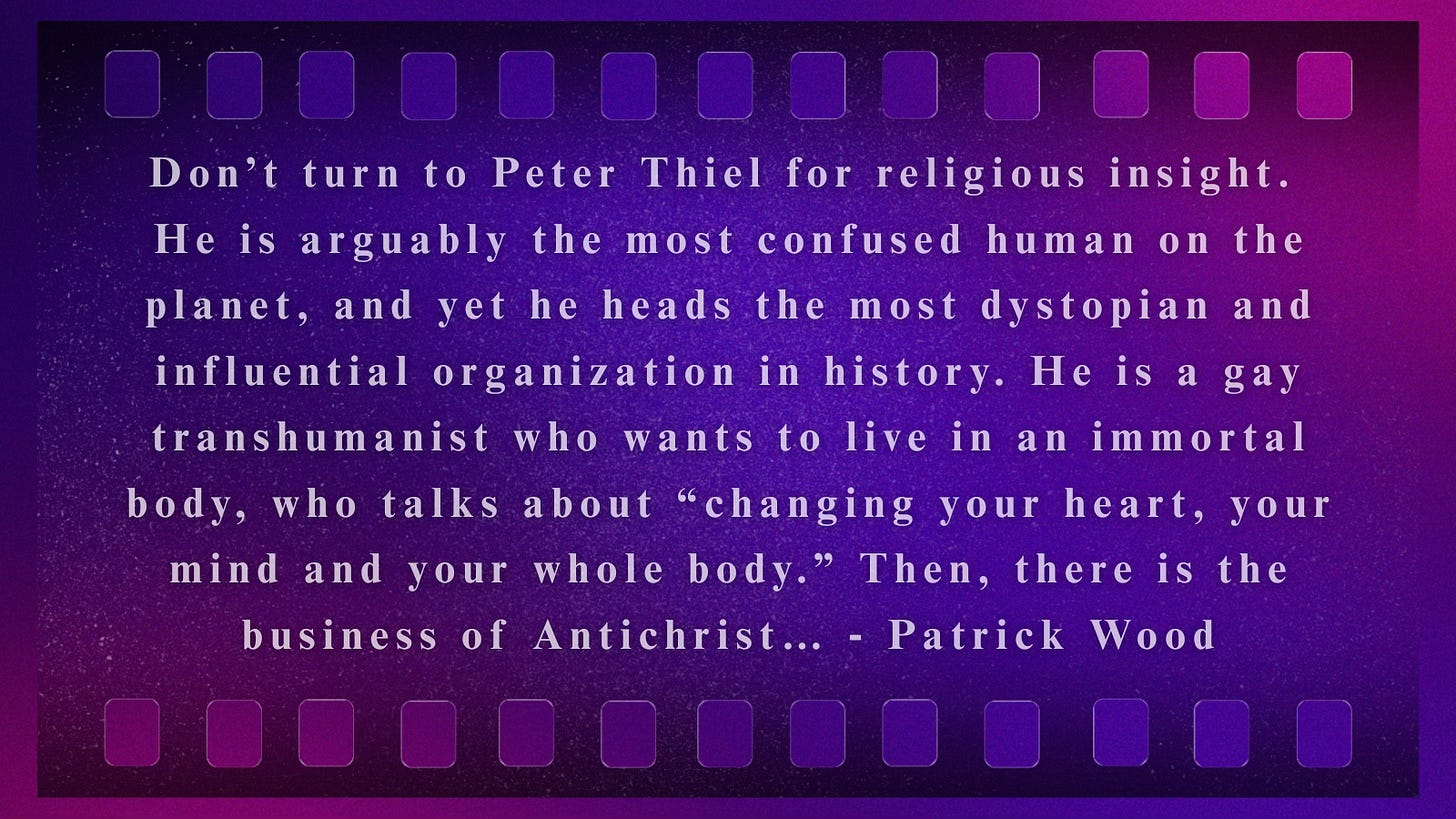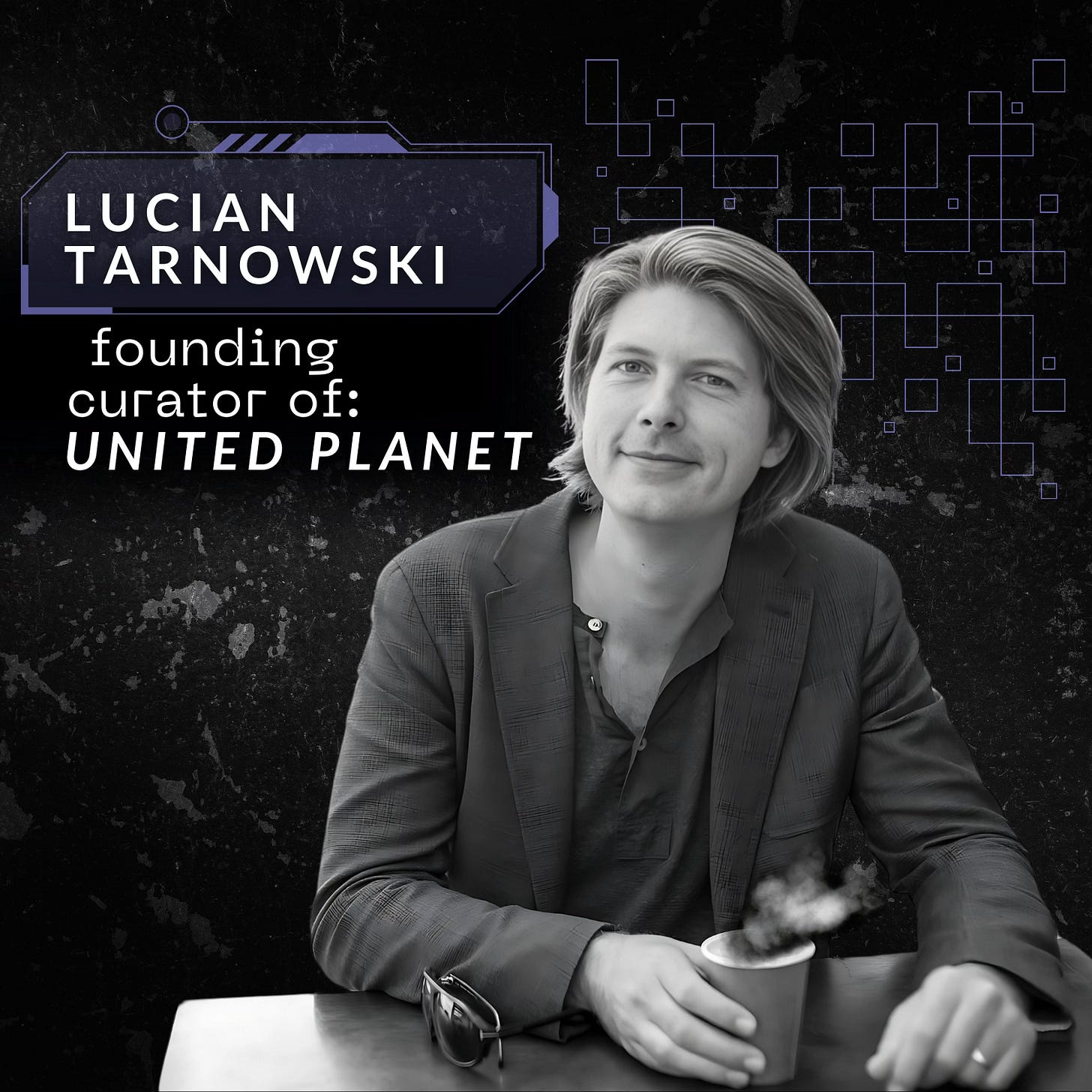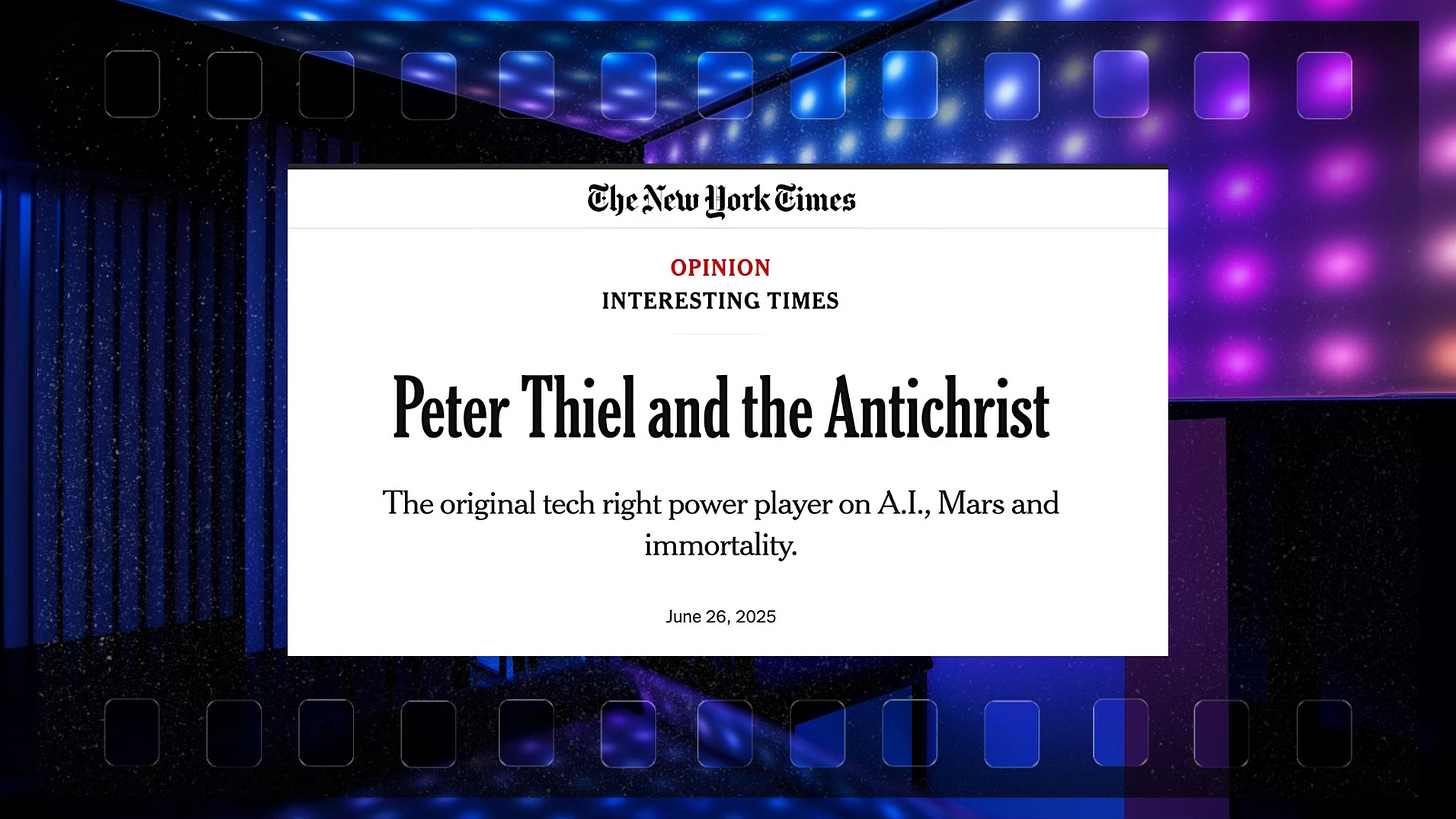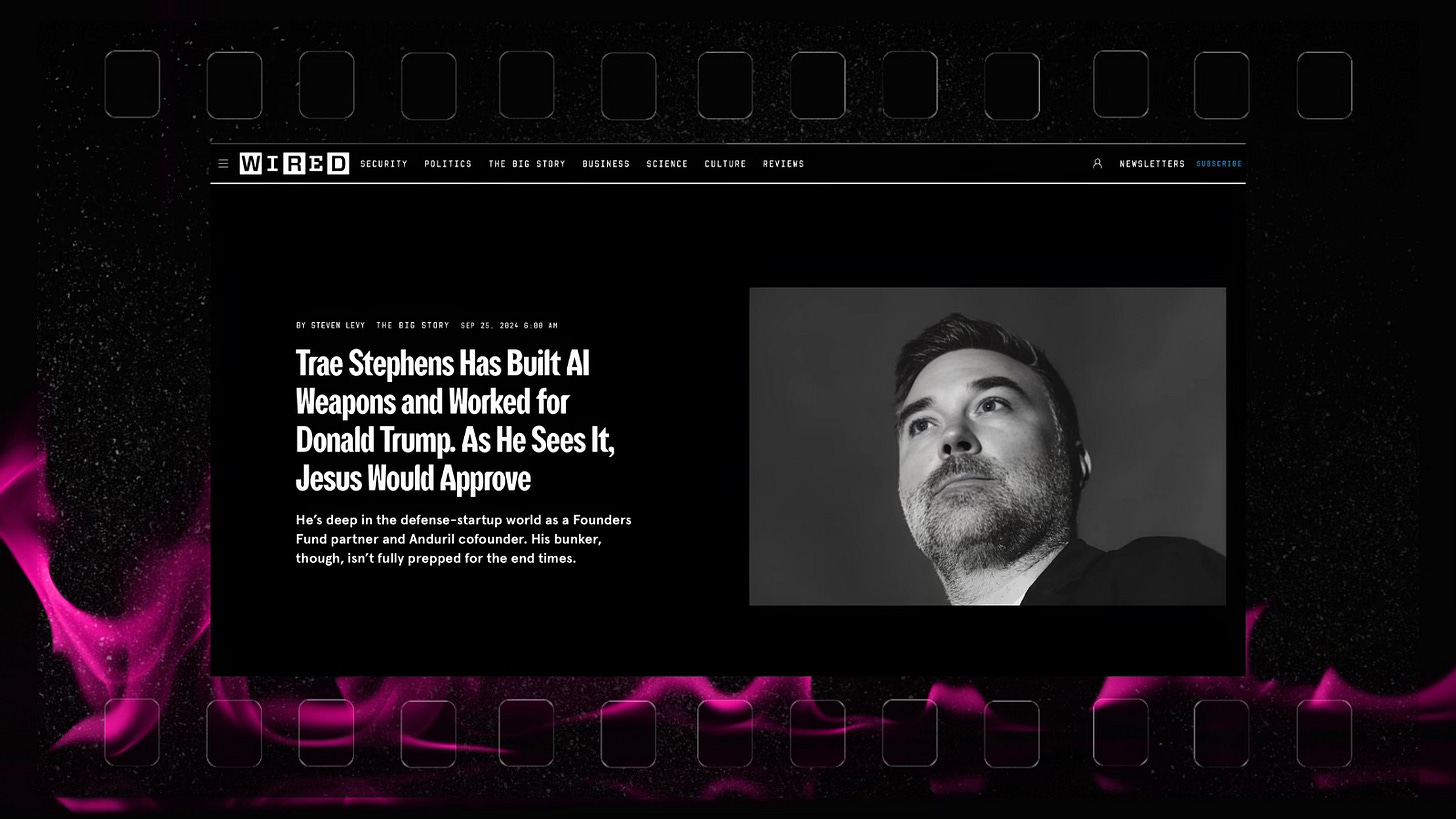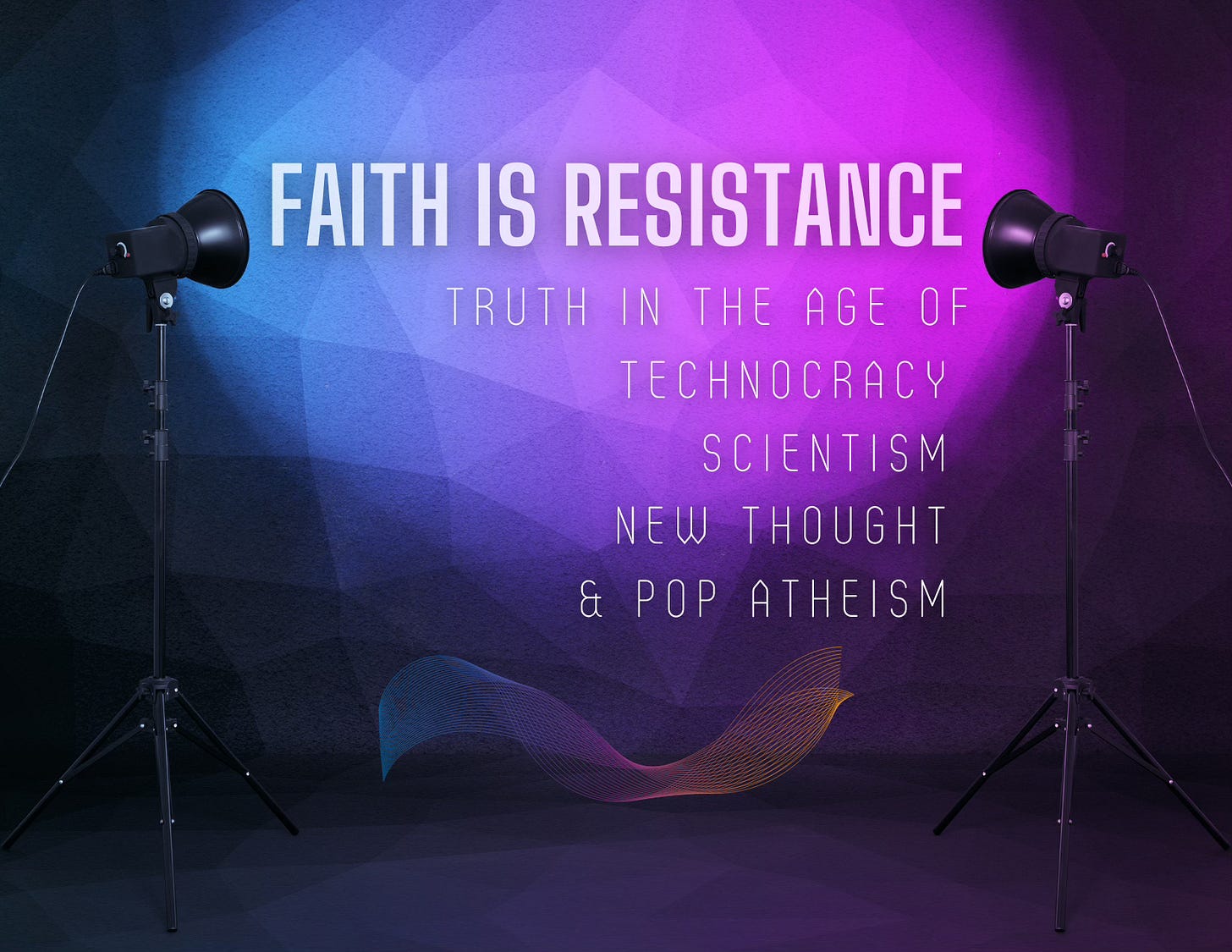Tech libertarian. Political kingmaker. Palantir’s godfather. Peter Thiel wears many crowns, but the strangest one is the cross he claims, reshaping Christianity in his image.
Thiel the Contrarian? Or the Perfect Progressive?
To many on the Left, Peter Thiel appears as the ultimate right-wing boogeyman, a billionaire financier bankrolling Trump’s populism, a Silicon Valley villain masterminding the supposedly dangerous Project 2025. But scratch beneath the surface, and a radically different narrative emerges. Far from opposing globalist technocracy, Thiel is one of its most sophisticated proponents, carefully clothed in pseudo-Christian rhetoric.
From Progressivism to Palantir
The managerial elites have long replaced biblical morality with a civil religion of perpetual progress, managing societies through engineered crises, technological conquest, and utopian promises.
Peter Thiel’s worldview perfectly embodies this legacy:
He praises Enlightenment scientism, specifically citing Francis Bacon and Condorcet.
Francis Bacon (1561–1626) and Marquis de Condorcet (1743–1794) were Enlightenment thinkers who championed the idea that human reason and scientific progress could perfect society and conquer death, ideas that laid the philosophical groundwork for modern scientism and secular utopianism.
He proudly references PayPal’s cryonics parties, a secular parody of resurrection that relies on freezing brains, hoping that future technocrats might raise the dead digitally.
He dismisses natural limits outright: “The word ‘nature’ does not occur once in the Old Testament… The Judeo-Christian inspiration is about transcending nature.”
This is transhumanism, precisely the worldview institutionalized by Agenda 211, recast here as a contrarian gospel.
Controlled Crisis: Stagnation and Technological "Risk"
In a recent interview on Interesting Times with Ross Douthat, titled A.I., Mars and Immortality: Are We Dreaming Big Enough, Thiel warns dramatically of societal stagnation:
“If we don’t find a way ‘Back to the Future,’ society unravels… You either have growth, or you have decline.”
His prescription? Ramp up risks in biotech, artificial intelligence, military surveillance, and nuclear energy—accelerating precisely the technologies that underpin global technocratic control. Beneath his call to risk-taking lies Palantir—Thiel’s own creation—a sophisticated surveillance and data-mining enterprise integral to one-world governance.
This is classic dialectical manipulation:
Manufacture fear of stagnation.
Advocate extreme technological control as the solution.
Invoke the specter of the "Antichrist" to sell biometric chains as necessary salvation.
From Thiel to Tarnowski
Thiel’s stark warning, “If we don’t find a way ‘Back to the Future,’ society unravels… You either have growth, or you have decline” echoes almost word-for-word the planetary myth-making preached by Davos darling Lucian Tarnowski’s United Planet. Tarnowski spins the same dialectic: stagnation is death, so a new elite must engineer a regenerative, “Gaian” future through myth, AI, and global governance.
Lucian Tarnowski openly preaches that humanity’s only hope is to reverse-engineer the story from the future, rewriting our collective myth in advance to steer society toward a “United Planet.” Thiel’s “Back to the Future” panic mirrors this exactly: both push the same engineered narrative, we must imagine the utopia, script it, and manage the risks to force it into reality.
It’s not faith. It’s not repentance. It’s Enlightenment self-salvation recycled as planetary technocracy, a counterfeit gospel written backwards from a future that never comes. It’s the age old lie from the garden.
Whether it’s branded as contrarian techno-libertarianism or planetary Gaian stewardship, the core lie is identical: salvation comes by collective human management of crisis. It’s Bacon and Condorcet’s Enlightenment dream, resurrected as a high-tech civil religion.
Although Lucian Tarnowski presents as a left-leaning progressive and Peter Thiel brands himself as a right-wing technocrat, both are ultimately expressions of the same progressive project, technocratic progressivism dressed in different costumes.
The Machine Gospel
Most revealing are Thiel’s remarks about Christianity and God’s sovereignty:
"God is not behind history. God is not causing everything."
Contrary to Thiel’s human-centered ideology, biblical Christianity affirms God's absolute sovereignty:
"The Lord has established His throne in the heavens, and His sovereignty rules over all." (Psalm 103:19)
"I know that You can do all things, and that no purpose of Yours can be thwarted." (Job 42:2)
Thiel also distorts Christian teaching on transformation:
“Orthodox Christianity… the critique [of transhumanism] is not that it’s weird and unnatural… It’s that it doesn’t go far enough… You also need to transform your soul and your whole self.”
True Christian transformation comes exclusively by grace through faith in Christ, not by human technology or intervention:
Therefore, if anyone is in Christ, he is a new creation. The old has passed away; behold, the new has come. (2 Corinthians 5:17)
Thiel’s "contrarian gospel" replaces Christ’s promise with technological engineering, revealing a fundamentally anti-biblical and anti-sovereign stance.
Co-opting Christianity: Silicon Valley’s Spiritual Strategy
Peter Thiel’s pseudo-Christian rhetoric isn’t an isolated phenomenon. It's part of a larger Silicon Valley trend to hijack Christian language and symbolism for technocratic agendas. According to Vanity Fair, “there are people that are leveraging Christianity to get closer to Peter Thiel.” Michelle Stephens of ACTS 17 Collective candidly admits, “People in tech are fundamentally motivated by money, fame, and power. People with a lot of clout or business acumen and cred is how you get them in the door.”
Movements like the multimillion-dollar "He Gets Us" campaign, backed indirectly by figures aligned with Thiel’s worldview, rebrand Jesus into a socially palatable figure stripped of divine sovereignty and biblical moral clarity. Michelle Stephens highlights this deception clearly, stating, “The Jesus we know isn’t the Jesus of religion. He is the Jesus of the people… Honest Christianity—despite what you may have learned or heard—is a radically inclusive faith.” That sounds literally straight out of the He Gets Us campaign.
The “He Gets Us” campaign is a multi-million-dollar U.S. marketing initiative launched in 2022 to rebrand Jesus with inclusive, socially progressive messaging often criticized for diluting biblical doctrine to appeal to mass culture; it promotes the Hallow app as part of this broader effort to package an ecumenical, therapeutic Christianity that blends Roman Catholic prayer practices with progressive, LGBTQ+ affirming, and interfaith themes.
Stop Calling Jesus A “Refugee”
Social justice manipulators of our day often claim that Jesus was a “refugee” just like the so-called asylum seekers who were flooded into the United States over the last 4 years. This concocted narrative is nothing more than a manipulation devised by social engineers that utterly ignores the historical and biblical context. Attaching the term to Jesus …
There is no publicly documented evidence that Peter Thiel directly funds the “He Gets Us” campaign; however, the initiative’s strategy aligns with the same elite philanthropic networks and faith-tech circles that Thiel influences, promoting a broad, inclusive rebranding of Christianity that complements technocratic and stakeholder governance aims. Notably, He Gets Us promotes the Hallow app, a venture-backed Roman Catholic prayer platform popular in Silicon Valley, further connecting the campaign to the same cultural currents shaping Thiel’s “contrarian gospel.”
Wired magazine highlights how Silicon Valley figures like Trae Stephens2 explicitly align their technocratic ambitions with Christianity, arguing that their work is critical “to carry out God’s command to bring his kingdom to Earth as it is in heaven.” Thiel himself frames technological progress in theological terms, claiming it aligns with “Judeo-Western optimism” and an “eschatological frame” for building heaven on earth.
This “ACTS 17 Collective” pitch, tech as “kingdom work,” “good quests” to transform society, bringing God’s kingdom to earth through business, defense, media, and elite networks is functionally Seven Mountain Mandate thinking in Silicon Valley packaging.
Core markers that prove it’s 7MM ideology:
The language of “bringing the kingdom to Earth” by transforming institutions.
Elevating entrepreneurship, capital, and defense tech as spiritual callings for cultural dominion.
Nudging believers to see their work as a form of spiritual warfare or “mission” to redeem whole systems.
Replacing repentance and gospel proclamation with managerial conquest of secular “mountains.”
What’s new?
Instead of wild charismatic spectacle or self-appointed apostles in revival tents, it’s venture capitalists, defense contractors, and Silicon Valley networks who pose as the new “anointed.”
Same blueprint — different costume.
It’s the same Dominionist drive that infected the NAR: We’ll build heaven on earth ourselves, mountain by mountain. Now it’s coded in elite tech-speak and tied to stakeholder technocracy.
It’s Seven Mountain Mandate 2.0 optimized for the Sustainable Development era.
Same error. Same spirit. Same fake kingdom.
This co-opted Christianity, exemplified by Thiel’s narratives, aims to redirect genuine spiritual hunger toward technocratic, elite-controlled "solutions."
One World or None? The False Binary
Though Thiel mocks figures like Greta Thunberg and dismisses degrowth proponents, his alternative is merely more technocratic intervention:
Increased AI integration.
Expanded surveillance.
Biotechnological experimentation.
Deepened public-private partnerships.
This mirrors Agenda 21’s stakeholderism, the so-called "sustainable" global regime marketed as progress, but built on technocratic servitude.
The Real Christian Gospel
Contrary to Thiel’s machine gospel, true Christianity proclaims:
The bodily resurrection achieved by Christ alone.
Salvation and freedom by grace through faith, not technological intervention.
A clear warning of sin and divine judgment, not manufactured fears of technological stagnation.
True Christianity declares unequivocally:
“I am the resurrection and the life. Whoever believes in me, though he die, yet shall he live” (John 11:25)
No Palantir. No cryonics. No Mars colony.
Just the Cross, the empty tomb, and an eternal Kingdom beyond human manipulation.
Dominionism for the Technocratic Age
Some might wonder: is this really Dominionism or the Seven Mountain Mandate? After all, it doesn’t look like the charismatic revivals or stadium crusades of the New Apostolic Reformation (NAR). But look closer, this is not a rejection of Dominionism; it’s an upgrade and a revamp for a different target audience and sensibility. For a generation poised and primed to receive the sleek new look.
Classic Dominionism taught that Christians must “take the mountains” - media, government, education, business, to usher in God’s kingdom on earth. Its leaders claimed special apostolic authority to steer nations spiritually and politically. The new Silicon Valley gospel keeps the same core impulse, but swaps out apostles and prophecies for technocrats, investors, and biometric surveillance.
Instead of revival tents and miracle healings, this new priesthood offers “mindfulness apps,” branded “Christian” influencers, and engineered spiritual experiences, all backed by venture capital and softly woven into global stakeholder governance.
The goal is the same: to immanentize the eschaton — bring heaven to earth by human effort. But this time, the method isn’t chaotic charisma, it’s orderly compliance through data and design.
This is a Dominionism perfectly suited for the Sustainable Development Goals era:
Managerial.
Technocratic.
Crossless.
Repentance-free.
Marketed in pseudo-Christian language about abundance, transformation, and building “heaven on earth.”
It’s the same old counterfeit kingdom, now wrapped in a hoodie and hiding in your phone. The real gospel still stands apart: Christ crucified, risen, and returning, not engineered, not managed, and not for sale.
A Convenient Strawman
To see how deep this deception runs, consider how the old Dominionism and the new technocratic “Christianity” feed the same machine. They’re two phases of the same counterfeit kingdom engineered to collapse biblical faith into a tool of global governance on one side, and a strawman for public vilification on the other.
Take the tragic case of Vance Boelter, instantly labeled by the media as “Christian nationalist,” “conservative extremist,” “Trump’s base.” But the real story is darker: Boelter’s radicalization traces back not to biblical Christianity but to the cult roots of William Branham3, Christian Identity, and the New Apostolic Reformation (NAR) the same lineage that built the Dominionist networks now mutating into tech-friendly spiritual branding.
This tangled root:
William Branham’s self-proclaimed prophecies and race-based distortions.
The Christian Identity heresy, fusing supremacism with pseudo-biblical myths.
Gordon Lindsay’s Voice of Healing empire, seeding the modern “apostolic networks.”
Christ for the Nations Institute (CFNI) the same pipeline that shaped Boelter’s twisted zeal.
Cult expert Dr. Steven Hassan warns: “They created a pyramid scheme where Branham and Lindsay sat at the top, pumping out apostles and prophets trained to control minds.”
The same ideological pipeline now flows into the Trump-era White House Office of Faith, with figures like Paula White-Cain, an heir to Branhamite deliverance theology, front and center, helping shape the Religious Liberty Commission. A Commission which, behind soothing slogans, subtly shifts the definition of “acceptable faith” toward ecumenical, therapeutic, and compliance-driven “spiritual unity” not the uncompromising gospel of Christ crucified.
So the cycle completes:
1️⃣ Cult distortions produce real violence and extremism.
2️⃣ The media lumps that heresy into “Christian conservatism.”
3️⃣ The White House Faith Office positions itself as the “solution,” defining what beliefs are safe — and what must be marginalized.
4️⃣ Technocratic elites like Thiel and the ACTS 17 Collective roll out the “safe” Christianity stripped of the Cross, full of compliance.
The result? The genuine faith gets smeared by cultic counterfeits and diluted by globalist spiritual branding.
As Peter (not Thiel, the apostle) warned:
“For it is time for judgment to begin at the household of God…” (1 Peter 4:17)
The real threat isn’t biblical Christianity. The real threat is false religion disguised as biblical Christianity and the world’s eagerness to weaponize that disguise to discredit Christ Himself.
We must see this for what it is:
A new Dominionism, upgraded for the technocratic age, designed to corral the faithful, brand dissent as dangerous, and replace true repentance with managed spiritual servitude.
Reality Check Moment
When Thiel references the Antichrist, pay close attention: he’s describing the very system he is helping build, a global technocracy promising engineered salvation by elite controllers.
Progressivism never truly died with the Trump admin, it simply put on a hoodie, called itself contrarian, and now lurks behind a billionaire’s mask of rebellion.
Integrating faith into every corner of life, not as genuine spiritual revival, but as a three-legged stool: Church + Corporation + State fused into a single technocratic governance machine.
In this ‘post-reality’ future, Christianity becomes the spiritual wrapper for surveillance, behavioral management, and permanent crisis control.
The aim? Dystopia isn’t just around us, it’s inside us, coded into our beliefs and nudged by faith-shaped algorithms.
But we know that man plans and God laughs.
Thank you for your time and attention, part 2 of this topic dropping soon.
Soli Deo Gloria
Summer Black, Director, Armor of Truth
Sources
Vanity Fair. “Christianity Was ‘Borderline Illegal’ in Silicon Valley. Now It’s the New Religion,” 2025.
Wired. “The Silicon Valley Christians Who Want to Build ‘Heaven on Earth,’” by Lauren Goode, March 14, 2025.
Agenda 21 is a non-binding action plan adopted at the 1992 United Nations Earth Summit in Rio de Janeiro, promoting sustainable development goals that critics argue advance global technocratic governance and centralized social planning.
Trae Stephens – American venture capitalist and tech entrepreneur; early employee at Palantir, partner at Peter Thiel’s Founders Fund, and co‑founder/executive chairman of Anduril Industries, the defense-tech firm behind AI-powered surveillance systems, autonomous drones, and the so‑called “virtual border wall.” Proclaiming to be a devout Christian, Stephens frequently discusses the intersection of faith with innovation and national security.
William Branham (1909–1965) was an American Pentecostal revivalist and self-proclaimed prophet whose healing crusades and claimed angelic visions helped launch the postwar charismatic movement and laid the groundwork for the modern New Apostolic Reformation.
technocratic governance · faith-based surveillance · integralism · Peter Thiel Christianity · Church Corporation State · post-reality dystopia · faith-shaped algorithms · spiritual control systems · corporate religion · Peter Thiel Antichrist · progressivism






